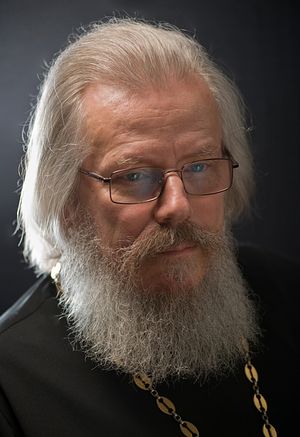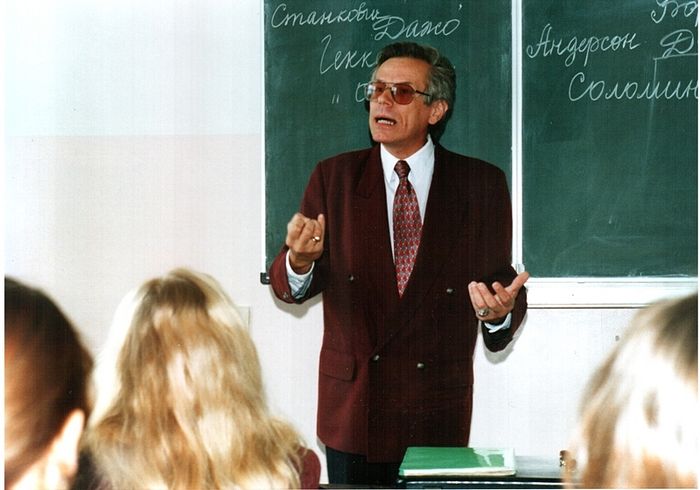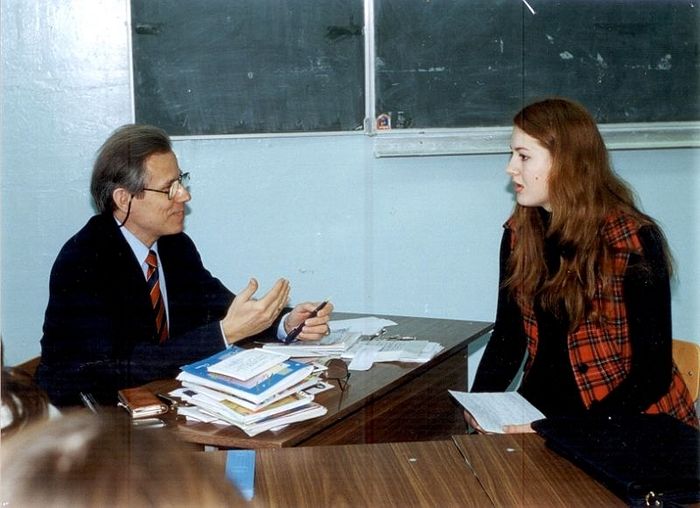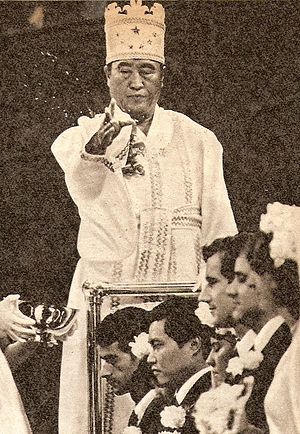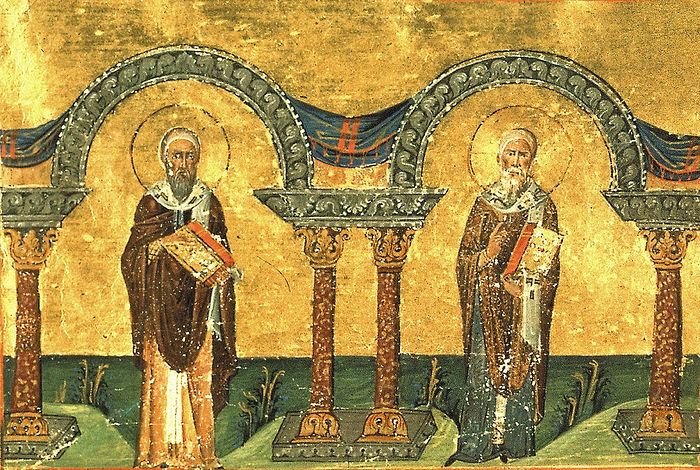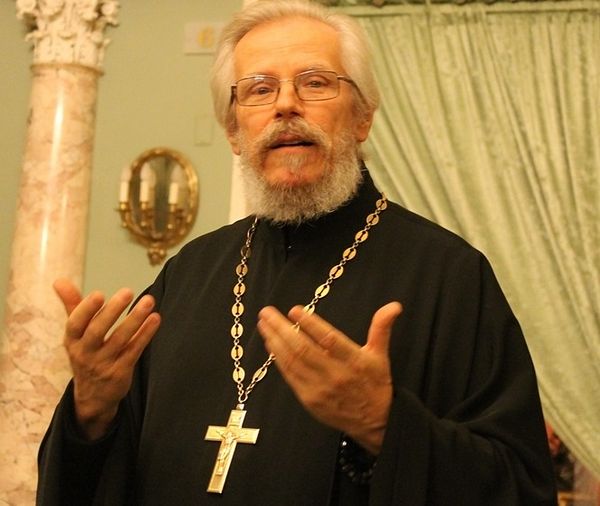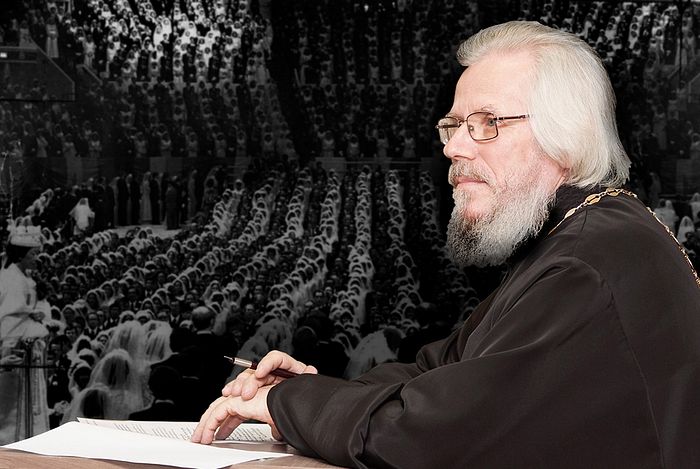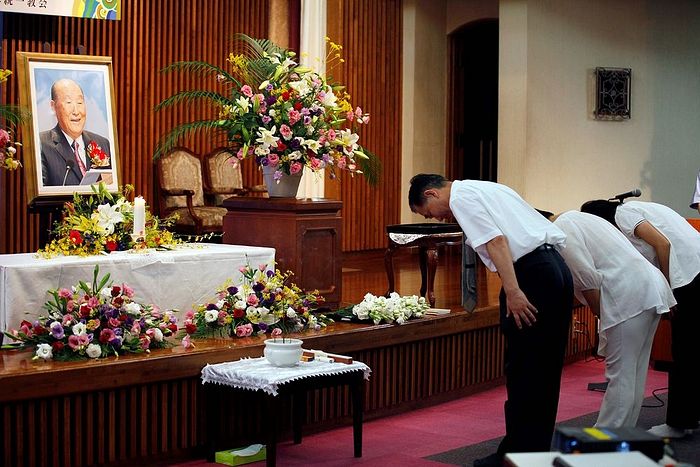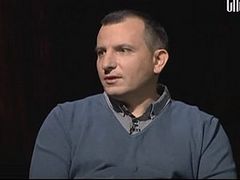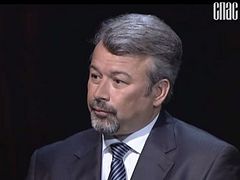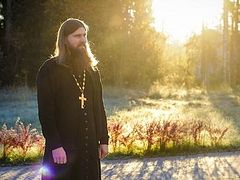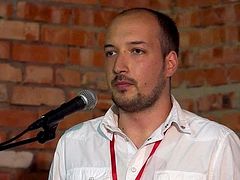We continue to publish the materials of Spas TV program My Path To God, where Priest George Maximov interviews people who converted to Orthodoxy. The guest of today’s program is Archpriest Lev Semyonov. He was baptized at a mature age, but all the years before his baptism he always considered himself Christian. After taking interest in their interpretation of the Bible, he joined the Unification Church … How did he, a Unificationist preacher and one of the leaders of the Russian division of this sect manage to separate the truth from lies? Is it difficult to quit a sect and why? What should you do if your close friend has joined a sect? What are the things you should never do in this situation? These are the questions that we will be discussing with Father Lev in today’s program.
Part 1 (Duration: 29:30):
Part 2 (Duration: 36:23):
Priest George Maximov: Hello! You are watching My Path To God. The guest of today’s program is Archpriest Lev Semyonov, Senior Lecturer, Doctoral Candidate of Historical Sciences, and head of the Spiritual Enlightenment Center of St. Tikhon Orthodox University of Humanities. I will tell you right away that Father Lev spent several years of his life in the Unification Church, a religious organization founded by Sun Myung Moon. Moreover, he held a high-ranking position in this organization, working as Deputy Chairman of the Council of the Russian Division. We will talk to him about this, but we should probably start from the very beginning.
Archpriest Lev Semyonov: Thank you, Father George, for making it easier for me. My religious quest dates back to my childhood and youth. Without discussing them, it would be difficult to understand how I could make that fateful mistake and lost six and a half years of my life as an adult.
As you suggested, I will briefly tell you about my distant childhood. I was born to a family of teachers and physicians. At that time, speaking about religion was not customary; moreover, it could be dangerous. I was an only child, so in a way I was spoiled. Unfortunately, I did not receive any religious education when I was a child. Although, a certain inherent affinity for learning about something empyreal manifested in me in my very early years. Nevertheless, I was ignorant in the matters of religion. For example, when I was five or six years old, I was passing by a church and saw a beggar asking for alms and making the sign of the cross. I didn’t know the meaning of that sign. I wanted to find out what it meant, but since my parents never talked about the Church, I intuitively would not dare to touch upon this subject and ask them about it. Instead, this was how I explained it to myself: This man is asking for alms and probably wants to show that he needs help, so he uses this gesture to show where it hurts. This story may seem amusing on one hand, but on the other hand, it is sad as it shows my absolute ignorance in the matters of faith.
Now let’s talk about the time when I was 17. It was the spring of 1963. I was looking for something in an old, early twentieth century oak bookcase. It was huge, and books on the shelves were placed in three rows. This is very good in terms of capacity, but extremely inconvenient when you want to get a book from the second or the third row. The advantage of this bookcase was that it allowed my parents to hide the books that they for some reason didn’t want to leave in plain sight. Once when I was looking for a book in the third row on the top shelf, I noticed a book that I never saw my parents read. It was a very nicely made book in morocco binding with golden edges and a golden cross embossed on the cover. When I opened the book, I saw that it was the Gospel. The text was arranged in two columns: in Church Slavonic and in Russian. That was the first time I held the Holy Scripture in my hands. Standing on the stool that I used to get to the top shelf, I started reading it from the very beginning. As at that time the questions of faith were quite foreign to me, Jesus Christ’s lineage that is described in the beginning of the Gospel didn’t seem interesting, but when I read further, I understood that this wasn’t something you read standing on a stool, it was something that required your full attention. Thankfully, there was nobody in the house on that day, so I climbed off the stool and kept reading until I finished all four Gospels.
Father George: What was your impression?
I made my parent sit on the sofa and started reading the Gospel to them: “Just listen to this!”
Father Lev: This was a turning point in my life. It shocked and amazed me. I was overwhelmed with the knowledge about this new, totally different way of life! It was a different reality, a different meaning of life. When my parents came home from work, I was so overwhelmed with juvenile naivety and enthusiasm that I made them sit on the sofa while I read the Gospel to them: “Just listen to this!” I kept on reading the book to them throughout the week until they heard all four Gospels.
Then I said something that shocked them. Remember, it was the spring of 1963, Khruschev was in power and persecution of the Church was at its peak. Amid all this, a 17-year old boy, after reading the Gospel of John, announced to his parents, “I have decided to become a priest, and so this summer I want to go a seminary to get proper education…” In response, they launched, so to say, the counter-propaganda campaign. They explained why I should not be doing this. Now, half a century later, I can understand my parents’ motives. I was their only son and, given the existing situation, they wanted a different future for me. They thought that perhaps I should be involved in some research. They thought that becoming a priest was dangerous and tried to talk me out of it in any way they could.
When they exhausted all their reasoning and saw that I was not giving up, they came up with their last argument that was irrefutable in my perception. They said, “Ok, Lev, you are turning a deaf ear to what we’re saying and you don’t care about your future. But have you thought about us? You are our only son. If you become a priest, people will wonder how we, a deputy principal at school and a physician in the hospital, could raise our only son to become a priest?” They won’t let us work long enough to be eligible to receive pension. We hoped that when you gain your footing, you’d be helping us and we will have some sustenance in our old age… If you go ahead with this, we will be blacklisted.” Under the existing conditions, this forecast was quite realistic. A person would be better off working as a night guard in a kindergarten, than being a deputy principal accused of bringing up her son so that he decided to study in a seminary. Alas, these were the times my generation grew up in. I hope that today’s youth wouldn’t forget about that period, because there is a lesson to be learned from those dangerous times and it is important to prevent those circumstances from happening again.
I couldn’t fend off this argument, because while I could decide my own destiny, I could not let my parents down. As a result, I made a decision that seemed a compromise to me: I decided to study the history of the Church and Christianity at the historical faculty. And I did.
This story about my journey is too long, so I’ll skip dozens of years and tell you what happened when I was 44. It was 1990. I was already a Candidate of Historical Sciences and a Senior Lecturer. I was delivering lectures at the university on such subjects as ancient history, the history of the world culture and religious studies. One day they summoned me to the rector’s office and the first pro-rector of the university suggested that I should go to some conference. He said, “Considering the subject of the presentations, this is right up your alley, something to do with religion.” It was an international conference, by the way, held in Sofia.
Father George: Father Lev, how did you perceive yourself at that time? Did you consider yourself a Christian, a religious person?
Father Lev: Thank you very much for this question. I forgot to tell you about a very important aspect of my story. When I understood that because of the circumstances I described earlier I wouldn’t be able to study at a seminary and chose a secular profession of a historian and researcher, I also realized that from the moment of my first encounter with the Gospel, I considered myself an Orthodox Christian. However, since my family did not have any traditions of religious upbringing, I was not religious at all. Naively and dangerously mistaken, I believed that reading the Bible and accepting Christ in your heart was all it took. I didn’t understand that it was important not only to accept Christ with your mind, heart and soul, but also to be within the Church, going to confession, partaking of the Holy Communion, living the life of the parish; that is, doing what is called “living in faith”. Failure to understand all this made me make a terrible mistake during that conference in Sofia in 1990.
Rather than an academic conference, this event turned out to be a so-called introductory workshop for the Unification Movement. This name was their more neutral cover; in fact, this event was organized by so-called “Church” of Moon. I say “so-called” because it is not a church at all, but a dangerous totalitarian sect. It had many disguises to suit any situation, offering diverse baits to lure people, including peacemaking projects, projects for youth, art and culture-related projects, etc.
Believing that you become a Christian simply by reading the Bible is a dangerous delusion. It made me make the fatal mistake.
Here’s why I think that the fact that I was not going to church attributed to the mistake I made in Sofia. I considered myself Orthodox, but never went to church. By that time I was already a practicing historian, even defended a dissertation on the first ages of Christianity (although it covered social aspects only), but I knew nothing about the legacy of the Holy Fathers or the Christian theology. As a self-taught believer, I based my opinions on what I could glean from the Bible and was content with it, considering myself Orthodox, even though the Sacrament of Baptism was never administered to me. I naively thought that even the Sacraments were not that necessary and assumed that it was sufficient to simply believe and follow Christ… It was a terrible delusion. I would even call it fateful. I attended the lectures of that introductory workshop that among other things promoted a sectarian interpretation of the Biblical text. In purely academic terms, I found it interesting and amusing. I deliberately use this word that sounds blasphemous when used in relation to the text of the Holy Scripture.
At that time, I did not differentiate between the texts of the New Testament and any other ancient texts. Working with the source document seemed the same to me, whether it was a text from the Gospel or some other manuscript, inscription on a stone, etc. So I found this unusual interpretation of the Bible interesting and thought that it could be a certain contribution to the historical studies of early Christianity, showing a different approach. I showed my interest in this subject and this immediately piqued the workshop organizers’ interest in me. They probably thought that I was a suitable person who could become the authorized representative of their organization, which was trying to make its way into Russia.
Father George: Why do you think the Unificationist’s ideas were popular at that time?
Unificationists used false pretenses to invite participants, disguising their workshops as academic conferences on religious studies.
Father Lev: I’d say there were two reasons. Firstly, there is something you can call an esoteric gap. Simply put, this is deception during enrollment. If the invitation they sent to the university said, “Moon’s Sect Workshop”, I would not have gone there. Even if I had an unlikely desire to accept the invitation to this strange event, the administration of the university would not have let me go there. In this case, however, the university even paid for this trip because they believed that this event was an academic conference. So, the sect was simply lying and concealing the actual purpose of its activity.
Secondly, the sect expertly played on some weaknesses of human nature. For example, many students liked attending those workshops, but not because they were interested in Moon’s teachings. Those workshops were held by Englishmen and Americans, native speakers of English. For young students, this was an opportunity to improve their English, see the world, visit a foreign country, and talk to foreigners. I know this first hand. If you could earn the students’ trust, they would admit that themselves. This was how it went. Thank God that this has all come to an end.
Father George: How did your promotion in the sect come about?
Father Lev: They were very interested in me, and after a while they even stopped concealing that it was very convenient for them that I was a Senior Lecturer at the university, a Candidate of Sciences, a mature person well over 40 with grey-haired temples… They thought that if I represented their sect, it would look respectable and might attract many followers. They were eager to promote me. As a result, I spent several years in the central offices of the Unificationist sect.
There is a silver lining in everything. What was it for me? If I remained a regular sectarian, maybe they would have managed to fully brainwash me and I wouldn’t be sitting here with you, but instead distributing handouts in some crummy office or delivering lectures on the Unificationist teaching—God forbid.
Father George: Why didn’t that happen?
Father Lev: There is one simple reason for that. My fast career growth within this dubious organization gave me access to much more information than what was available to regular sectarians. I found out that they were violating laws in many ways. I publicized all that information later and provided documented proof. If they could refute it, they probably would have tried. However, I’ve been telling the world about the unsavory actions of Moon’s sect for nearly 20 years now, and nobody could repudiate me for one simple reason. When I realized that I made a fateful mistake and that this sect had nothing to do with Christianity and its teaching was, in essence, anti-Christian, I decided that simply quitting the sect would not be enough. I felt responsible for other people that may have joined the sect and ruined their lives because of me. This was very upsetting for me. I understood that after quitting the sect I would have to tell everybody about it and criticize it. But this should not be a simple expression of my opinion; I should be able to provide well-documented facts. So I, jokingly speaking, turned into a spy for almost a year and a half. Since I had access to all offices and computers, I stayed up late and when everybody left, I copied, Xeroxed and printed documents that confirmed various illegal activities of the sect.
Father George: Can you give us an example of those illegal activities?
Workshops were held at the best resorts and the lease was paid by illegal cash, even though those transactions involved millions of roubles.
Father Lev: There were violations of migration, passport and visa regulations. Economic violations too: the workshops were held at the best resorts of the Baltic Countries or in Crimea, and the lease was paid by illegal cash, even though those transactions involved millions of roubles that sometimes were illegally channeled to dishonest hotel administrators. This worked fine for the sect. They also violated the Cadastral regulations—that is, the offices were misused and the leased premises were turned into offices and centers that accommodated 20-30 sectarians. I have receipts signed by some high-level people who were helping the sect. I gathered a great number of such documents, and now a whole shelf in St. Irenaeus of Lyon Center is filled with the materials on Moon’s sect. There is also a whole bookcase filled with such materials in St. Mark of Ephesus Center in Tver. I referenced many of these documents when I published my open letters about Moonism [1].
Father George: Was discovering the seamy side of the Unificationist movement the main reason for quitting this organization, or did you have any other reasons?
Father Lev: There was another very important reason. The sect initiated an absolutely absurd project—they wanted a team of authors to write a book that would prove that Moon’s teaching was very close to the ideas of Christianity, Orthodoxy and Russian spiritual traditions in general. Since I was an expert on the ancient world, my job was to write the section on ancient times. That was when I started studying the legacy of the Holy Fathers for the first time. I really wish I had come across their works earlier! I discovered the works of five authors, including St. Athanasios of Alexandria, three Cappadocian Fathers and St. John Chrysostom, and they became the foundation for my understanding of the teachings of the Church. Later I studied the works of the Apologists and other early and later Church Fathers, but these five names were like guiding lights that showed me the truth. When I started studying their works in-depth in a futile attempt to find something that could be linked to the Unificationist views, I suddenly realized that this was the real theology and the real truth! Not those feeble attempts originating in Moon’s electro-technical background, when he used plus/minus formulas to graphically explain the universe and its evolution.
These were the two aspects that helped me quit the organization: blatantly unlawful activities of the sect on one hand, and the real Christianity of the Holy Fathers on the other hand. And I thought that I was a Christian! I was deluding myself into thinking that I was confessing Christianity! I delivered the Sunday sermons in the sect, gave lectures and held discussions… I thought that I was talking about God and believed that I was engaged in some religious activity. I was really drawn to this activity. It made me joyous, excited and inspired. However, I did not have an example or a standard. I read the Gospel in my youth, but only when I came across the legacy of the Holy Fathers, did I fully realize how false and deceitful were the “theological” teachings of Unificationists, and where the light of truth really was. So it was the Holy Fathers who saved me and dragged me out of the sect.
Father George: After you quit the Unification Church, you took some time before speaking out against it. What was the reason for that?
Father Lev: When I gathered a sufficient amount of incriminating evidence, I quit the sect, but indeed, I did not have the heart to speak out publicly right away. You know, even though I was gathering all that evidence to criticize the sectarians… I spent several years with these people. We went on business trips, shared hotel rooms, and drank tea together. Socially, our relations were good and sometimes even friendly. We visited with each other, I knew the kids of some of my co-workers. A daughter of one of the leaders of the sect took her first steps in Crimea when I took her out for a walk. So, socially, there was something that made it difficult to denounce the sect… I couldn’t start criticizing the sect the next day after officially quitting. Psychologically, I needed some time to take a step back and re-evaluate everything. That was why my first public statements about the sect were made only a year later. After that, I published some articles and participated in some TV shows…
In the course of this active work, I suddenly thought, “I consider myself Orthodox, but what kind of an Orthodox am I, if I don’t go to church?” So, can you imagine, three days before my 53rd birthday, I received the Sacrament of the Holy Baptism. From that moment on… I would describe that six and a half year period in the sect as a nightmare, but the time after Baptism felt like living in paradise. What do I mean? When I received the Sacrament of Holy Baptism, I was told to attend the next Liturgy to partake of the Communion. I thought, “I consider myself Christian, but I haven’t even been baptized. This is wrong.” So I got baptized. They told me I had to partake of the Communion, I said, “Sure, I’ll do it…” But I didn’t even think that it would have any effect on me. I thought that I’d just know that I was baptized, got the baptismal cross on a string, and did everything that was required. I received the Sacrament of the Holy Eucharist on the first Communion of my life. On the next Sunday, even though I wasn’t used to getting up early, I felt that I needed to. From that moment on, I started attending all Sunday Liturgies.
People in the church where I was baptized knew that I was a Senior Lecturer in the university and that I defended the thesis on the history of the ancient Church, so they asked me if I could deliver some lectures on this subject in the Sunday School for adults. And so, a week after my baptism I became this church’s Sunday school teacher. A month later, I became an altar server in this church. A year after my baptism I was ordained into deaconship and started my ministry.
I thought that I would be teaching at the university and serving as a deacon on Saturdays, Sundays and feast days till the end of my days. I didn’t even think about anything else. However, later, without any involvement on my part, the bishop decided to appoint me chairman of the newly created diocesan missionary department and ordain me into the priesthood. I decided that it was the will of God. I was surprised, of course. Naturally, it was a pleasant surprise, but I didn’t consider myself worthy or ready for this. I was quite happy in the humble position of a deacon. Anyway, I have been a priest for more than 15 years now.
Father George: So God made your adolescent dream come true.
Father Lev: Yes, almost 40 years later, when I was over 50 years old…
Father George: How did you part with your past? Did the Unificationists try to stop you or talk you out of quitting?
Father Lev: After I quit the sect, there was a period that lasted a couple of months, when the leaders of the sect tried to make me come back. They called me and spoke to my relatives trying to persuade them to talk me into changing my mind and returning. Compared to some other sects that try to retain their followers more aggressively, Unificationists, in my experience, are more cowardly. In Russia, their image was their utmost concern. When their calls became annoying, I resorted to fibbing: I told them, “If you call me one more time, I’ll come to your office and there will be a showdown.” Then I hung up. There were no more calls after that. To be honest, I don’t even know what I could have done then. I’m not armed or dangerous, and never trained in any martial arts. This trick, however, made them leave me alone.
Members of the sect are under a strict media blockade. They watch and read only what the sect leaders tell them to.
There was another thing that bothered me. For two years after I quit and started criticizing the sect, the sect has been concealing this fact from the followers. The thing is, members of the sect are under a strict media blockade. They do not read newspapers and do not watch TV. They watch and read only what was recommended by the sect leaders. So, there are no sources from where sectarians can receive any critical information about the sect. Once the parents of a girl who joined the sect reached out to me, and when I was helping them I learned that she was watching the video that I recorded several years ago, when I was still in the sect. They kept on showing it to the followers. Of course, many noticed my absence, as earlier I was always in Moscow, and they often saw me making speeches at various events of the sect… But when the leaders were asked about me, they would say, “He is very busy with his teaching job in Tver University, so he’s now working in our department in Tver.” To conceal the fact that I quit, the followers in Moscow were told that I was employed in either managerial or some other position in the Tver division of the sect. Then it became impossible to hide it, and years later I saw a long discussion on the Unificationist’s website about why Lev Semyonov quit them. Luckily, it is all in the past now.
Father George: After quitting the sect, have you met any person you knew in the sect who also quit?
Father Lev: Father George, I would be eternally happy, if I could meet such people. Although I have been telling everybody the truth about the sect for almost twenty years now, trying to prevent people from joining it, I still regret not only the six and a half years I spent there, but also the fact that, directly or indirectly, I could have influenced some people’s decision to join the sect. I do hope that many of such people have already quit. It was a pity to see how the followers of the sect wrecked their lives. Some of them had outstanding artistic abilities. There were occasions when people quit their post-graduate studies in the University of Moscow to become the slaves of the sect and let it decide their destiny. Young people who joined the sect are not allowed to choose their spouses. The sect finds life partners for them and sometimes the grooms and brides meet only at the ceremony of the Unificationist wedding, that they call a “blessing”. So the person you spend your whole life with is chosen for you by the leader of the sect. This is perhaps the most extreme violation of personal rights, for it is difficult to imagine a more flagrant intrusion into a person’s private life than choosing a spouse for him or her.
Quitting a sect is a very difficult process. That is why, just like in medicine, prevention is more effective than treatment.
Quitting a sect is a very difficult process. That is why, just like in medicine, prevention is more effective than treatment. It is extremely difficult to get anybody out of a sect. They are indoctrinated and brainwashed to such extent that they do not understand the severity of their situation, and their friends and relatives can no longer help them. Such people would not go to a rehabilitation center to talk to an Orthodox priest and learn the truth about their sect. They have blinders on their eyes and listen to their gurus only. This is applicable not only to Unificationists, but to any other totalitarian sect.
Father George: I hope to God that people would find the courage to quit. Actually, lately the Unificationists’ activity appears to be on the decline (perhaps this is related to Moon’s death in 2012). I used to meet these people—usually young—in the street, when they were offering handouts. I remember that once in the late 1990s a couple of women approached me in the street, saying, “We are from the Unification Church. Would you like to sign a petition for peace and buy something to support the world peace movement?” As I had just recently read about Moon, I said, “It is a bit strange that I should sign his petitions for world peace when he owns a couple of weapon factories. Something doesn’t add up here.” And they said, “Are you without sin?” (Laughs). I used to have such amusing meetings quite often. However, it’s been a while since I have seen any Unificationists or even heard about their activities.
Father Lev: I think we can gladly attest that after Moon’s death even the main branches of the sect in US, Korea, Japan and Western Europe experienced crises. These crises, of course, affected Russia too. Unfortunately, this does not mean that Unificationists stopped their activities altogether. Just recently, the parents of a young couple that joined the sect came to see me in the church. I hope that these are some residual effects that are fading away. However, we should remain vigilant. The most important thing (I emphasize the prevention practices again) is to do everything to ensure public awareness so that people can make their free choice.
Father George: Father Lev, I’d like to ask you about your church life, which began fairly late in your life. Was it difficult for you as an adult to start living the church life and to change yourself and your habits?
Even though I became a priest over fifteen years ago, I still can’t believe how lucky I was.
Father Lev: I had to change only one habit. I was a typical “night person”, and usually went to bed at 2 am and got up as late as I could. Naturally, when I started attending services in the church, I had to get rid of this habit. It was quite easy. Things like that do not matter, Father George, because the spiritual joy you feel while standing at the altar and ministering to God cannot be compared with anything. You know that very well yourself… Even though I became a priest over fifteen years ago, I still can’t believe how lucky I was. I am amazed every time I approach the altar. I can’t stop feeling that joyful amazement, for lack of a better word. “Did it really happen? Is this what happiness means?” That is why some routine aspects, like this is more convenient or that is less convenient, do not mean anything. These aspects are not even of secondary importance, they barely matter at all.
There is a term called “neophytism” that is used to describe a special fervor of a new convert. Newly converted people are said to be extremely enthusiastic and see everything through rose-colored glasses. It is also believed that later this fervor fades away. However, since 1998 when I received the Holy Baptism, I have not lost a single neophytic trait. I don’t know, maybe it is not normal, but for me everything is as fresh, exciting and interesting as it was in the beginning. This is what makes your life whole. It is something that is your whole existence, like the air you breathe; it is something that gives you strength and energy. Especially, if you consider than on the last day of last year I turned 70, so I am not a young person by any measure. But, as you see, I’m still trying to do something.
Father George: Actually, neophytism is intuitively based on valid and essential feelings. Firstly, the desire to share your faith with others. Secondly, the desire to change yourself according to this faith, so that you are as Christian as you can be, rather than simply being called a Christian. Of course, there can be mistakes, such as being overly confident, overestimating your abilities, and excessive strictness toward others. It is unfortunate that such things happen. However, the main thing about neophytism is that “first love” referenced by God in Revelations: Nevertheless I have somewhat against thee, because thou hast left thy first love. (Rev. 2:4). So when people do not abandon their first love they felt when they joined the Church, it is in fact a very good thing.
Father Lev: I fully agree with you, Father George.
Father George: You mentioned prevention. What should people do if it didn’t help, and their friend or relative joined a sect?
Father Lev: There are two very important aspects. First, they need to contact a professional exit counselor as soon as possible. “As soon as possible” here means they need to do it in the first few days, rather than a month, after their friend or relative joined the sect. If their children started attending some suspicious meetings or bringing home some quasi-religious brochures, the parents should start fighting for their children immediately, before they are fully immersed in the sect. This is the first principle: talk to an exit counselor as soon as possible.
The second aspect is that the family should never criticize the sect or its leader. This will only alienate the person who is interested in the sect’s teaching and likes it. It is particularly important for the following reason. Unfortunately, people often join sects because they are not satisfied with the relationships in their families or because their parents or relatives do not understand them and they feel neglected. All these weaknesses are exploited by the principle of “bombardment with love” used by Unificationists and several other sects, which involves paying insincere, hypocritical and overwhelming attention to the people who join the sect. They give newcomers a very warm welcome. Everybody surrounds them and pretends to admire any talents they might have, shamelessly exaggerating them. If a person knows two chords on guitar he learned yesterday, they’d bring him a guitar and say, “Try it out, play. You are the next Elvis Presley! Go on, develop your talent.” If a person dabbles in poetry, they would tell him, “Recite your verses! Wow! This is pure genius! You need to develop that talent!” While at home, these people’s families don’t care about their guitar strumming or poetry. So such fake and artificial interest is used by sects to recruit people.
That is why the closeness that exists between relatives, even if it is minimal, should never be shattered. There should not be any discussions about the sect – Let this be done by specialists, who know what to say. Rather than criticizing the sect, people should try to find some common ground. For example, if a person is into painting, you can offer, “It has been a long time since we’ve been to the Museum of Arts. Let’s go and look at some paintings.” That is, it is necessary to find something that unites, rather than separates you. When family starts criticizing the sect that a child or a friend joined, this yields terrible reverse results. These are my basic recommendations.
Father George: Dear Father Lev, thank you very much for your story. I am sure that it will be important for those who have not made their choice yet and help them to avoid making those wrong steps that they would later regret.

